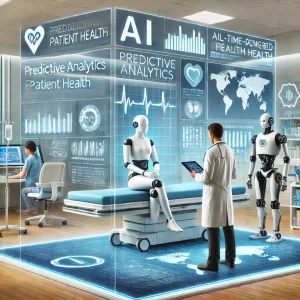
We can now predict diseases before they happen, allowing for early intervention and better patient outcomes.
Hospitals are becoming more efficient, reducing wait times and optimizing patient care through advanced data analytics.
Treatments are now tailored to each patient’s unique biology, ensuring more precise and effective medical solutions.
Healthcare Data Analytics is reshaping how we diagnose, treat, and prevent diseases. Yet, many healthcare systems still rely on outdated, manual processes that lead to inefficiencies, medical errors, and missed opportunities to save lives.
The technology exists. The data is there. But the question remains, why isn’t it being fully utilized?
From Guesswork to Precision: The Power of Data in Healthcare
For decades, healthcare has been reactive, diagnosing illnesses after symptoms appear.
With AI-powered analytics, we can anticipate health risks, personalize treatments, and optimize hospital operations, turning data into life-saving decisions.
Breakthroughs in Healthcare Data Analytics
Predictive analytics is identifying early warning signs for chronic conditions like heart disease, Alzheimer’s, and cancer, enabling intervention before symptoms develop.
Precision medicine is eliminating the one-size-fits-all approach. By analyzing genetic data, AI can customize drug prescriptions and therapies to match each patient’s unique biology.
Smarter hospitals are leveraging real-time data to prevent overcrowding, optimize staff schedules, and reduce medical errors, ensuring better care delivery.
Financial and operational efficiency is improving as data analytics helps hospitals cut down on unnecessary procedures, prevent over-prescription of medications, and reduce insurance fraud and billing inefficiencies.
The result is that lives are saved. Costs are reduced. Patient care is transformed.
Real-World Impact: This Isn’t Just Theory, It’s Happening Now
Google’s DeepMind AI is diagnosing over 50 eye diseases, years before symptoms appear, preventing blindness.
IBM Watson Health is scanning vast amounts of patient data to recommend precise, personalized cancer treatments.
The Mayo Clinic is leveraging machine learning to improve diagnosis accuracy and speed, reducing misdiagnoses.
Epic Systems is using AI-powered clinical decision support to assist doctors in real time, flagging potential risks before they escalate.
Yet, 80% of healthcare data remains unused.
While hospitals face staff shortages, overcrowded emergency rooms, and skyrocketing costs, critical patient insights are sitting untapped.
This isn’t just due to technology, it’s more of a leadership issue.
The Urgent Call to Action: It’s Time to Catch Up
The biggest hurdle isn’t a lack of technology, it’s resistance to change.
Regulatory red tape is slowing down AI adoption in hospitals.
Legacy systems are keeping patient data siloed, preventing seamless integration.
Data privacy concerns are making institutions hesitant to embrace cloud-based solutions.
But this inaction is costing lives.
The future of healthcare must be data-driven, because anything less means delayed diagnoses, inefficient treatments, and higher mortality rates.
The Healthcare Leaders Who Embrace Data Will Define the Future
Hospitals must invest in AI-powered decision support tools.
Healthcare leaders must push for data interoperability across systems.
Policymakers must accelerate AI adoption while ensuring patient privacy.
Tech innovators must collaborate with medical professionals to create human-centered AI solutions.
This is more than improving operations, it’s about saving lives, reducing suffering, and delivering healthcare that truly works.
